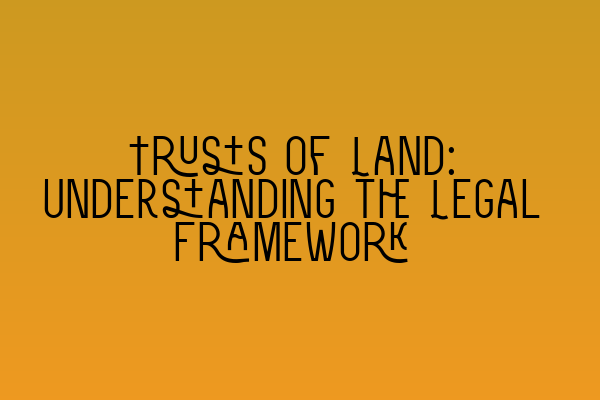Trusts of Land: Understanding the Legal Framework
Welcome to our blog post on the legal framework surrounding trusts of land. Whether you are a solicitor specializing in property law or a curious individual interested in understanding the intricacies of trust law, this comprehensive guide will provide you with a deeper understanding of trusts of land.
Trusts of land play a crucial role in property transactions and can have significant implications for property owners and investors. It is therefore essential to have a clear understanding of the legal framework and the key concepts surrounding trusts of land.
What is a Trust?
Before diving into the details of trusts of land, let’s start with a brief overview of what a trust is. A trust is a legal arrangement in which one party, known as the settlor, transfers assets to another party, known as the trustee, to hold and manage for the benefit of a third party or group of individuals, known as the beneficiaries.
The Legal Framework for Trusts of Land
Trusts of land in England and Wales are primarily governed by the Trusts of Land and Appointment of Trustees Act 1996 (TOLATA), which sets out the legal framework and principles for the creation, administration, and enforcement of trusts of land.
Key Concepts in Trusts of Land
There are several key concepts that are important to understand when dealing with trusts of land. Let’s explore these concepts in more detail:
1. Trustee’s Duties: Trustees have fiduciary duties to act in the best interests of the beneficiaries and to manage the trust property prudently. They must also exercise their powers in accordance with the terms of the trust and the law.
2. Beneficiaries’ Interests: Beneficiaries of trusts of land have beneficial interests in the trust property, which entitle them to a share in the ownership, use, and income derived from the property.
3. Trust Property: Trusts of land involve the transfer of legal ownership of property to the trustees. The property can include various types of land, such as residential properties, commercial properties, and agricultural land.
4. Trust Deed: A trust deed is a legal document that sets out the terms and conditions of the trust, including the powers and duties of the trustee, the beneficiaries’ interests, and any restrictions or conditions on the use or sale of the trust property.
5. Trustees’ Powers: Trustees are granted certain powers to manage and deal with the trust property. These powers may include the power to lease or sell the property, enter into contracts, or borrow money on behalf of the trust.
6. Disputes and Remedies: Disputes can arise in relation to trusts of land, such as disputes over the management or sale of the property, disputes between co-owners, or disagreements regarding beneficiaries’ interests. In such cases, parties can seek remedies through the courts, including an order for sale, partition, or an injunction.
Conclusion and Further Information
Understanding the legal framework surrounding trusts of land is essential for anyone involved in property law. By familiarizing yourself with the key concepts and principles, you will be better equipped to advise clients and navigate the complexities of trust law.
If you are preparing for the SQE exams, it is crucial to have a comprehensive understanding of trusts of land. We recommend checking out our SQE 1 Practice Exam Questions and SQE 1 Practice Mocks FLK1 FLK2 to test your knowledge and practice answering exam-style questions.
Furthermore, if you are looking for comprehensive preparation courses for the SQE exams, we offer SQE 1 Preparation Courses and SQE 2 Preparation Courses to help you succeed in your exams.
Stay up to date with the latest SRA SQE Exam Dates to ensure you are well-prepared and ready for your exams.
At SQE Property Law & Land Law, we are committed to providing expert advice and resources to help you excel in your legal career. Feel free to explore our website for more informative articles and resources on various legal topics.
Disclaimer: This blog post is provided solely for informational purposes and should not be construed as legal advice. Please consult with a qualified solicitor for legal advice specific to your situation.
Article written by SQE Property Law & Land Law.
